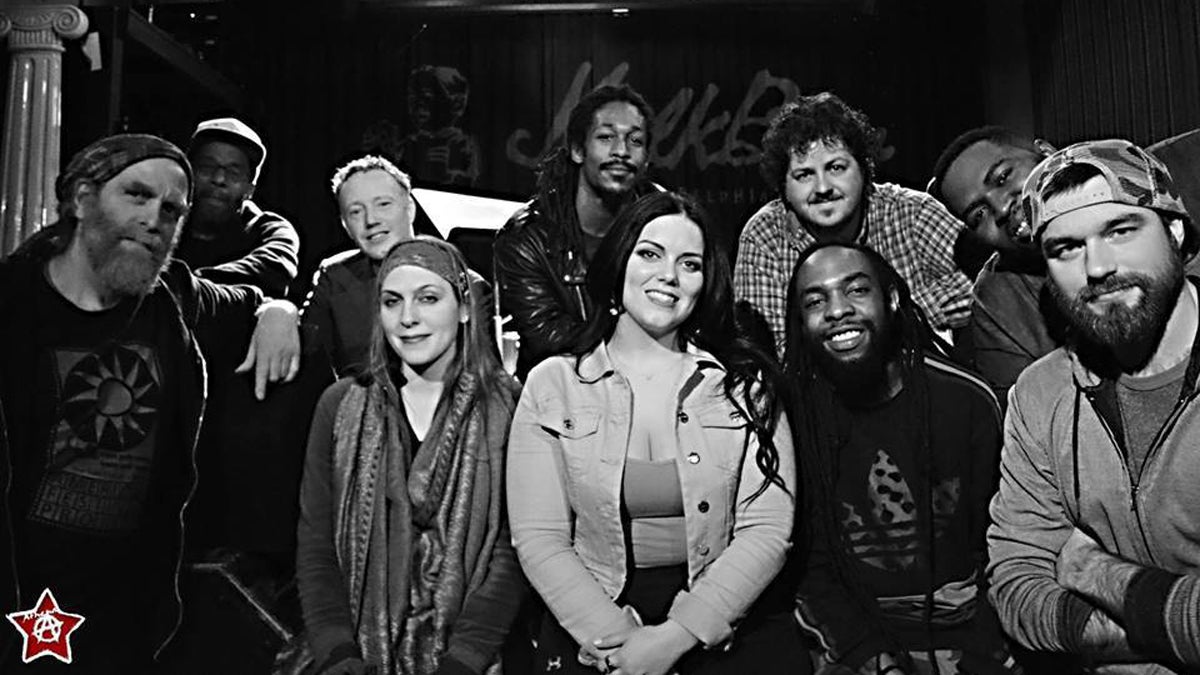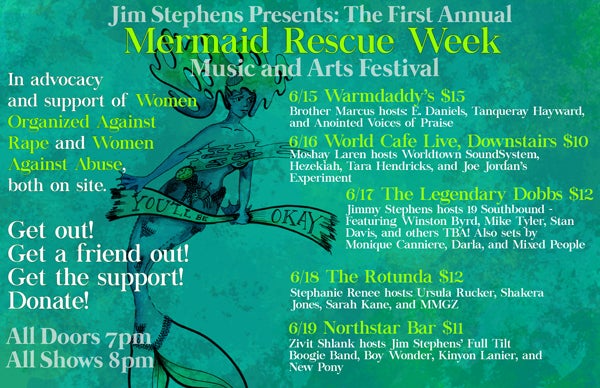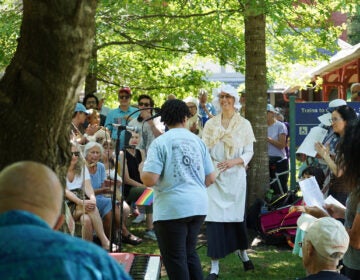Using music to connect victims of abuse to support resources

Jim Stephens’ Full Tilt Boogie Band (Image courtesy of Athena Music)
When I began working in Philadelphia years ago, one of the first people I met was a young musician named Jim Stephens. He was open, earnest and empathic, and he was passionate about addressing two key areas in Philadelphia: poverty, and rape and domestic abuse. And as for me, his journey was just unfolding.
Fast-forward several years to this spring. I’d recently checked in on how Stephens and his band — Jim Stephens’ Full Tilt Boogie Band — were doing and saw that they, and some other pretty stellar musicians, were planning a June event in Philly called Mermaid Rescue Week.
I had to know what that was all about.

Turns out his passions — for music, for addressing abuse, and for seeing his work as both art and social service — had taken on even more specific form.
As he described the week of events, I found the musical range and lineup thrilling. Each evening, hosted at five venues, has a slightly different musical flavor, drawing on gospel music, world music, hip-hop, blues, soul, jazz and funk. It struck me that all of these styles had originated in communities historically beset with struggle, discrimination and economic oppression.
“Yep, you hit the nail on the head,” Stephens agrees.
“There’s poverty and hardship and crime in Philadelphia,” he says. “These artists have come up through these struggles. But art is about life. Art saves lives. Their music is positive and empowering.”
It’s positive, in part, because so many of the artists involved — including Philly rapper Hezekiah, singer Tara Hendricks, Worldtown Soundsystem, and Joe Jordan’s Experiment — promote social causes through their work. “It’s something you can’t teach people to do,” Stephens says, “but so many do it anyway. They can give back to the community through their art.”
Stephens says he has been adamant about combatting rape and abuse. And, in understanding the need for security and privacy that support, Stephens came up with the twist that makes Mermaid Rescue Week unique. Instead of simply raising awareness and funds, the week of music, which partners with Women Organized Against Rape and Women Against Abuse, will also be a doorway to support service itself.
Representative of WOAR and WAA will be on site each evening, he explains. “That way, if a woman who is going through abuse or who experienced rape is there, it’s easier for her to get some information — a conversation with one of the reps, a card — and just say she was going to the concert. It’s easier to come to a concert where you’re more anonymous, versus the emotional toll involved in a walking into an office cold and asking for help. This is a more free way to make the initial contact — to make it easier for women to access these services in a more friendly environment.”
In this way, the arts can further social justice by creating the space for that justice to most comfortably happen.
“Artists have more power than anybody,” Stephens says. “And so many people don’t realize what they’re able to do.”
So what was he interested in seeing from this first venture into such a new kind of undertaking? “We’re hoping for people to come out and take the services offered by WOAR and WAA. But then we’re hoping to get the support for a similar set-up for next year, only more. We hope to start next year on Sunday evening with a silent auction with the best artists in the city to raise money, and have the ending concert on the [following] Saturday.”
It took years and sweat and effort for such a big opening act, so to speak. But Stephens’ passion outweighs the time and demands. “It’s been something personal to me for a long time,” he says. “You know I was trying 10 years ago to work on this, and I’ve been working in media on it for 15 years. Anyone who knows me knows that this and poverty are the two things I’ve fought against forever.
“I felt the need to provide an outlet, literally, to provide a more comfortable environment for people to get the services. If you don’t get that intervention, there’s a high probability it will come back to destroy lives. It’s something I’ve seen first-hand. This is an easier way.”
WHYY is your source for fact-based, in-depth journalism and information. As a nonprofit organization, we rely on financial support from readers like you. Please give today.




